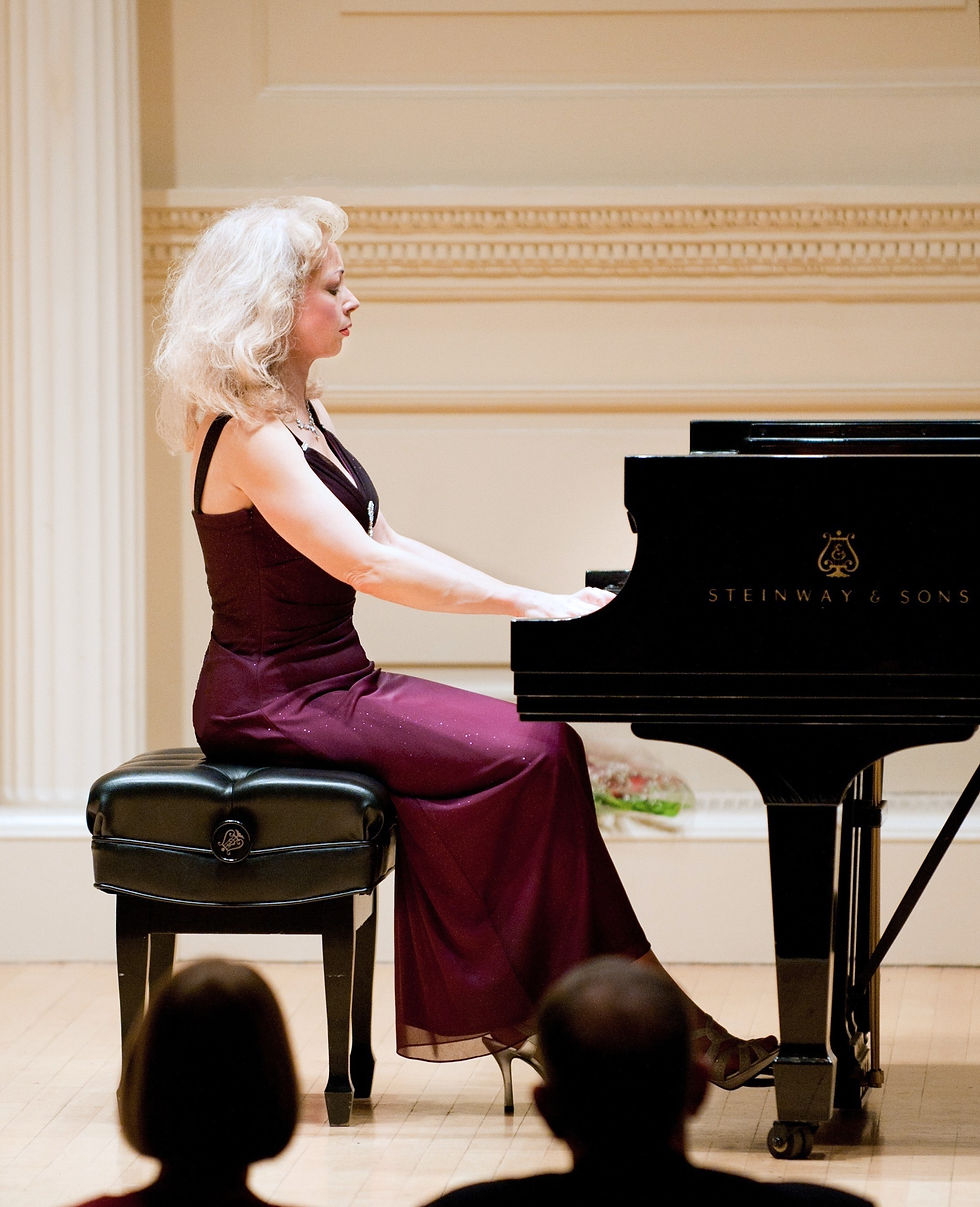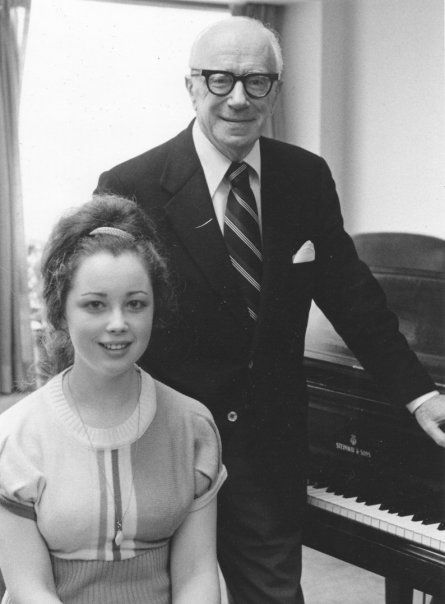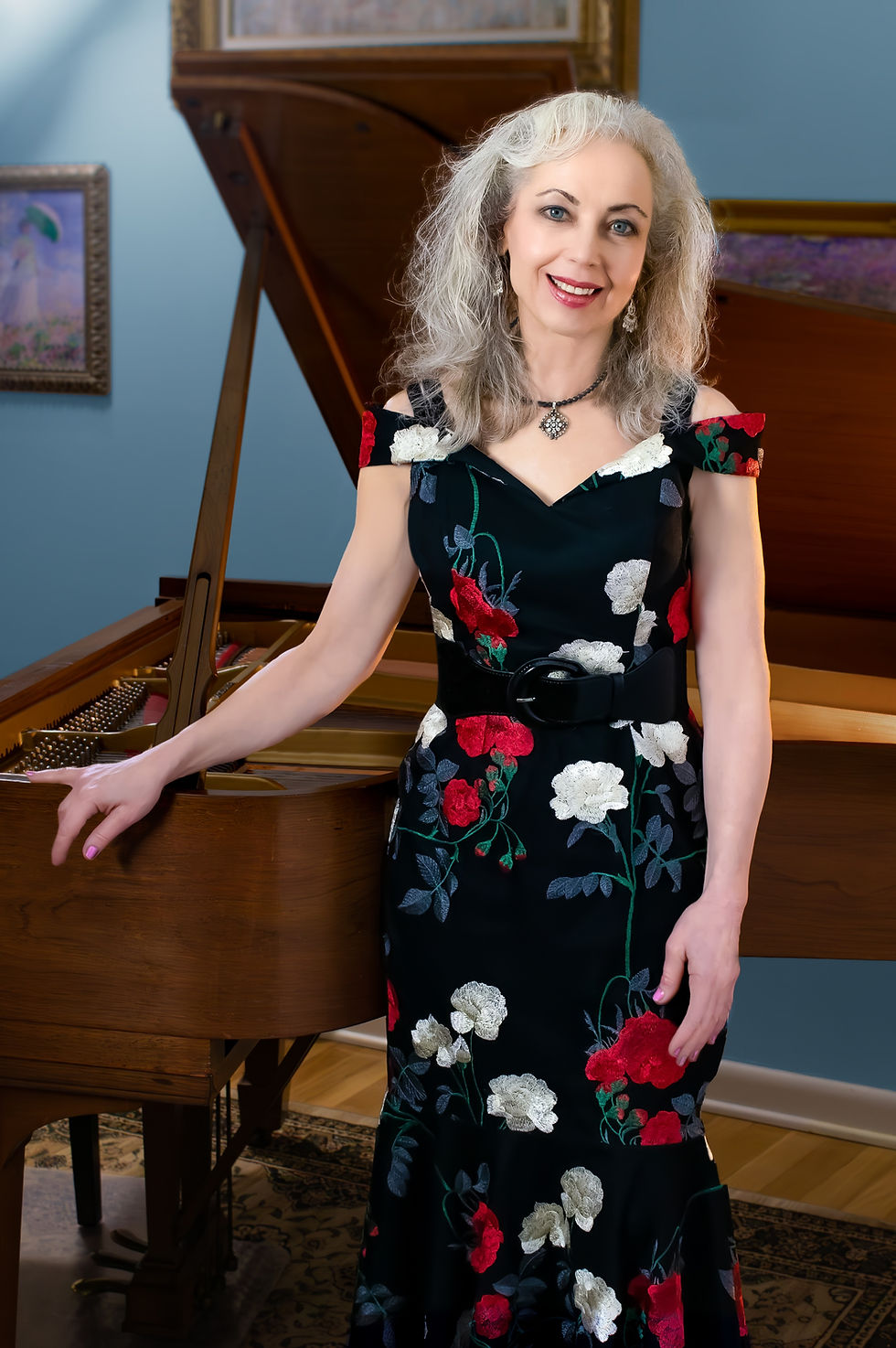When They Were Young: Classical Pianist Sophia Agranovich
- Eileen Bluestone Sherman

- Jul 29, 2025
- 6 min read
Updated: Jul 30, 2025
By Eileen Sherman

At the tender age of ten, Sophia, you were the youngest to ever compete in and win the Mykola Lysenko International Competition in Ukraine. But first, would you fill us in on your early childhood years in Ukraine? When did you begin playing the piano, and what drew you to it? Was it “love at first sight” with the keyboard, or like any youngster, did you need that extra push for discipline?
I was born in Chernivtsi, a multicultural jewel of a city in Ukraine, then a republic of the Soviet Union. Often referred to as a "miniature Vienna and Paris," Chernivtsi has long been a cradle of artistic and intellectual brilliance, the birthplace of countless writers, poets, musicians, and scientists. The city has welcomed legendary performers like Chopin and Liszt, and its stunning architecture—an eclectic blend of Art Nouveau, Baroque, and Gothic styles—bears witness to its rich history. Chernivtsi National University, now a UNESCO World Heritage Site, stands as a proud symbol of its cultural legacy.

From an early age, I was immersed in this vibrant environment, surrounded by art, theatre, literature, poetry, ballet, and especially music. Concerts, radio broadcasts, television programs, and my parents’ extensive LP collection provided a constant soundtrack to my childhood.
My father, a dentist with a deep love for music, had a strong scientific mind. My mother, an English teacher and translator, was a true intellectual—fluent in Russian, Ukrainian, English, German, and French. She painted, composed poetry in both English and Russian, and possessed a profound appreciation for literature, music, and the arts. She taught me to read at the age of three and introduced me to concerts, opera, and ballet by the time I was four. Her lovely soprano voice often filled our home with opera arias and popular songs, nurturing my early love of music.
We had a piano at home, and I was instinctively drawn to it from an early age, often experimenting on my own. My mother, my first teacher, introduced me to the basics. But it was a recital by the great Sviatoslav Richter, which I attended at the age of five, that changed everything. Under his extraordinary touch, the piano became a universe unto itself—at times sounding like a full orchestra, at others like a variety of distinct instruments. It was then that I realized the piano’s boundless expressive power. I felt that anything—any feeling, any thought—could be conveyed through it.

Tell us about your first formal music school. What was it like? Did you have any favorite teachers? And how about a favorite composer as a little girl?
I began formal piano lessons with a professional teacher at the age of five, soon passed exams, and was admitted to Chernivtsi Music School No. 1. Around that time, I also discovered a deep love for the music of Mozart—his clarity, elegance, and emotional depth captivated me.
By the age of six, I gave my first public performance. People began calling me a prodigy, convinced I was destined for a life in music. I simply focused on learning and playing, rather than seeking praise. I was incredibly fortunate to study with two remarkable teachers, Anna Stolyarevich and Alexander Edelmann, both of whom are considered among Ukraine’s finest. Their pedagogical lineage was extraordinary: both had studied under Heinrich Neuhaus in Moscow and had been classmates and close friends of Vladimir Horowitz at the Kiev Conservatory, in the class of Felix Blumenfeld. Their mentorship was profoundly inspiring and shaped my early musical foundation.
As my studies progressed, I began performing regularly, and some of my concerts were broadcast on the radio and television, further fueling my passion for music and performance.
Now, by the time you are ten, did you already want to become a concert pianist and practice, each day, with that goal in mind? Did you ever feel that you had to sacrifice other childhood activities to accommodate your piano studies, or was this simply the world you wanted more than anything?
My interests extended far beyond music. I grew up surrounded by classical literature and visual art, and over time developed an intense curiosity about science as well. I loved to draw and paint, attended the theatre regularly, and enjoyed gymnastics, running, and swimming. At school, I was especially captivated by mathematics, science, and literature—but above all, I dreamed of becoming a ballet dancer! Still, the piano remained a constant joy. I loved to play, to improvise, and to compose. I had perfect pitch, a natural technique, and a photographic memory, which made studying music feel almost effortless. For example, by the age of twelve, I had learned the complete set of Chopin Etudes.

Wow! All that natural talent, dedication, and passion certainly explain such early success! You have won dozens of very impressive awards, but I suspect that the first one, at ten, the Mykola Lysenko International Competition, holds a very dear place in your heart. Do you remember what the preparation was for that award? What did you play? Where did it take place? How did they announce the winners that year? Did that competition cement the idea that you certainly would become a concert pianist?
Winning First Prize at the Mykola Lysenko International Competition came as a genuine surprise—I had entered mainly for the experience. The competition unfolded over three rounds in three different cities: the first in Chernivtsi, the second in Lviv, and the final in Kyiv. Each round had a different jury, and winners were announced and awarded at the end of every stage. My program was considered ambitious for my age, but I loved the challenge: Bach’s French Suite No. 2, Mozart’s Sonata in F Major, Chopin’s Etude No. 4, and in the final round, Chopin’s Concerto in E minor.
My teachers strongly encouraged me to pursue a professional career and apply to the prestigious Central Music School at the Moscow Tchaikovsky Conservatory. But my parents were reluctant to let me go. They were very traditional. They were unwilling to relocate and didn’t feel comfortable with the idea of their 10-year-old daughter living alone in a dormitory. I was raised with the belief that a woman’s place was within the family and that a profession involving travel was not ideal. So, becoming a concert pianist wasn’t something I planned. Still, I continued studying with my remarkable teachers and enjoyed practicing, performing, and growing through music.
Yet, five years later, at the ripe old age of 15, you found yourself at Juilliard in NYC. Tell us all about that journey. How did it happen? Did you want to come to America and study? What were your impressions of Juilliard and your teachers when you first arrived? Did the style of teaching feel familiar, or did it all seem very different? Did you come to America with a knowledge of English, or was it a “learn on the job” experience?
Of course, I had heard of The Juilliard School as a child—I remember watching its celebrated graduate Van Cliburn on television after his historic victory at the Tchaikovsky Competition in Moscow. I also dreamed of one day visiting New York City. Just before we moved to the United States, my teachers encouraged me to apply to Juilliard. At the time, it felt like an impossible dream. But once we settled in Brooklyn and I enrolled in the 11th grade of high school, my parents rented an upright piano, and I resumed practicing. One day, my father brought home a Juilliard catalog. As I looked through it, I realized that my repertoire was ideally suited for the entrance auditions.
Within a few months, I took the exams, and to my amazement, I was accepted with a full scholarship. I had the great honor of joining the studio of the legendary Sascha Gorodnitzki, Chairman of the Piano Faculty, who made a rare exception by admitting me as a pre-college student. Professor Gorodnitzki was considered one of the world’s foremost piano pedagogues and had studied with Josef Léhvinne, a contemporary of Rachmaninoff and Scriabin. I was also fortunate to study with the distinguished Nadia Reisenberg, who carried the legacy of the St. Petersburg piano school through her teachers Leonid Nikolaev, Josef Hofmann, and Alexander Lambert—a student of Franz Liszt himself.
In addition to piano, I studied composition and musicology with renowned figures such as David Diamond and Joseph Bloch. I explored chamber music and ensemble with Felix Galimir, Paul Doktor, and Samuel Sanders. To my delight, I found the Russian and European piano tradition I had grown up with continued at Juilliard. However, the atmosphere was different—professors were more respectful, supportive, and allowed students greater artistic freedom than I had experienced back in Ukraine.
As for English, I began studying it while still in Ukraine. After arriving in the USA, I accelerated my learning by reading Les Misérables in English translation—first a paragraph a day, then a page, then a chapter—using an English-Russian dictionary. That method, more than any class, helped me gain fluency.
After earning both my Bachelor’s and Master’s degrees in Music from The Juilliard School, I was honored to receive a fellowship to teach piano at the school while pursuing my doctoral studies at Columbia University. I remain deeply grateful to my parents and to my extraordinary teachers for their guidance, which has not only shaped my performance career but also continues to inspire my work with students, passing on the grand tradition of the masters!





Comments